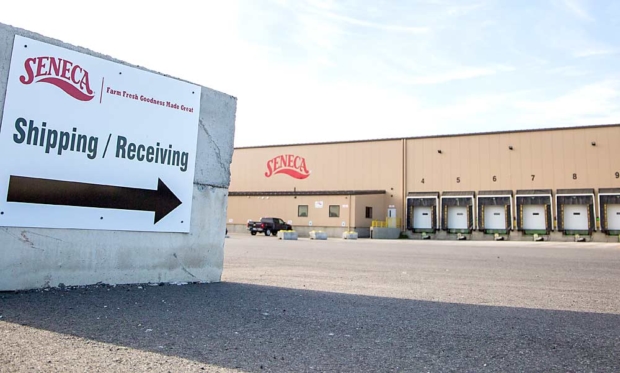
Northwest pear growers may respond to Seneca Foods closing its Sunnyside, Washington, processing plant by pulling out orchards as the pear industry continues to struggle with oversupply and a flood of cheap canned pear imports.
“We’ve been worried we were going to lose another cannery,” said Doug Field, a member of the Washington State Fruit Commission and the owner of Excel Fruit Brokerage Co., in Yakima, Washington, which works with all the pear canners in Washington and Oregon.
Seneca Foods, based in Marion, New York, plans to shutter its Sunnyside facility in the fall after honoring existing contracts to growers for the 2019 harvest, said Tim Benjamin, the chief financial officer. The company also has struck a deal with Pacific Coast Producers of Lodi, California, to sell its remaining pear inventory and this year’s crop, Benjamin said.
Seneca owns one of three pear processing facilities in the Northwest, the nation’s top producing region. The others are Del Monte in Yakima and Neil Jones Food Co. in Vancouver, Washington.
Last year, Seneca processed roughly 18,000 tons of pears. The other two split the remainder of the total 100,000 tons last year.
The entire U.S. canned food market, including pears, is declining due to an increased preference for fresh produce and inexpensive imports.
“We haven’t been profitable there for a while,” Benjamin said of the Sunnyside plant. The company made a similar decision when it closed its peach processor in Modesto, California, in early 2018.
The company also processed 13,000 tons of apples in Sunnyside but won’t do any this year, Benjamin said. The Sunnyside plant has about 70 year-round employees and typically adds 200 or more during the peak harvest season, he said.
“It wasn’t taken lightly, the whole thing,” Benjamin said. “We had some seriously dedicated people there in Sunnyside.”
Fresh implications
The closure could also have a ripple effect on the fresh market, which will be asked to absorb some of those extra pears.
The fresh market is coming off a year of lower prices due to a spike in volume in 2018. Washington and Oregon growers expect to finish the 2018-2019 season having packed about 19 million 42-pound boxes of fresh pears, up 19 percent from the previous year.
The closure is a blow to an already struggling pear industry.
“It’s sad and disappointing that we lose a good company like Seneca that’s been a partner for the industry for many years,” said B.J. Thurlby, business manager of the Washington-Oregon Canning Pear Association.
The organization collectively negotiates a set price on behalf of growers with Del Monte and Neil Jones — $353 per ton in 2018 — while Seneca has historically followed suit and honored the same price. Negotiations for the 2019 price are underway now, Thurlby said.
Thurlby believes the other two companies have the physical capacity to pick up the difference, but the market can only handle so much. Those other canners only can what they think they can sell.
The industry expects up to 30,000 tons of imports this year, mostly from China. That’s far more than Seneca canned last year.
Prices for imported canned pears are routinely between 30 and 50 percent lower than the cost of production here in the United States, said Rich Baldoz, a Yakima-based fruit industry consultant with a history of working with U.S. processors.
The end result could be that some growers just pull out their Bartletts — far and away the most common canned variety — and plant something else, Field said.
“Imported canned pears are coming in at well below our production costs here in the U.S.,” he said. •
—by Ross Courtney






Leave A Comment